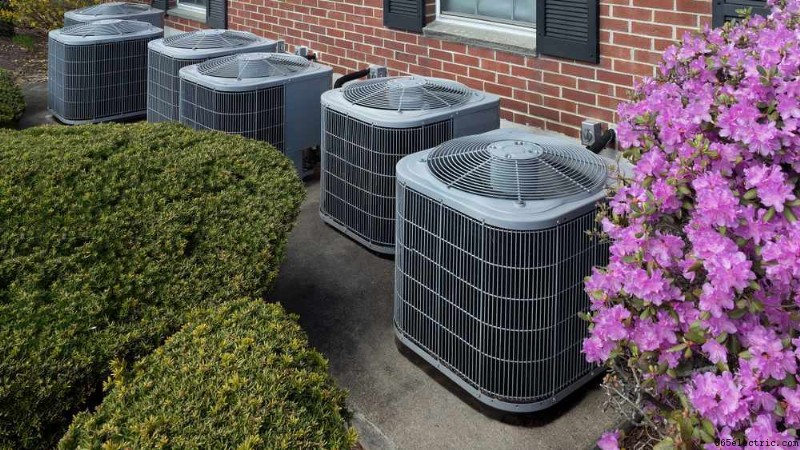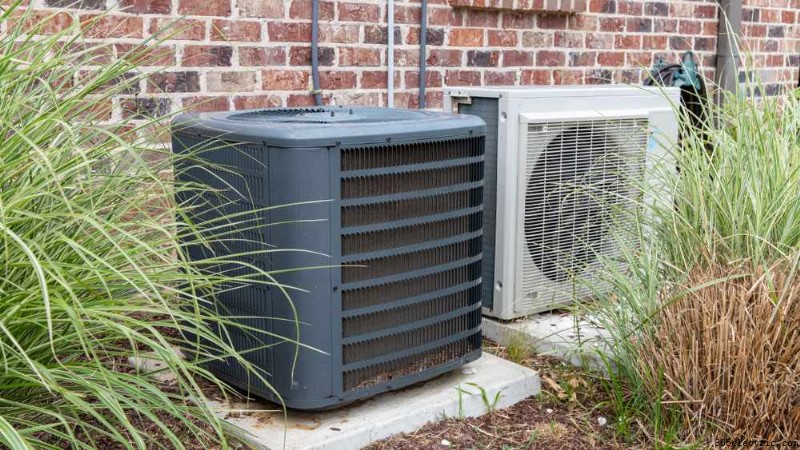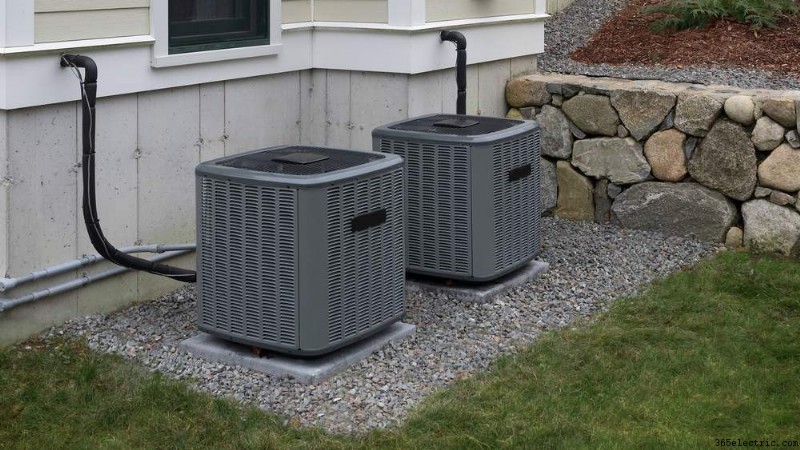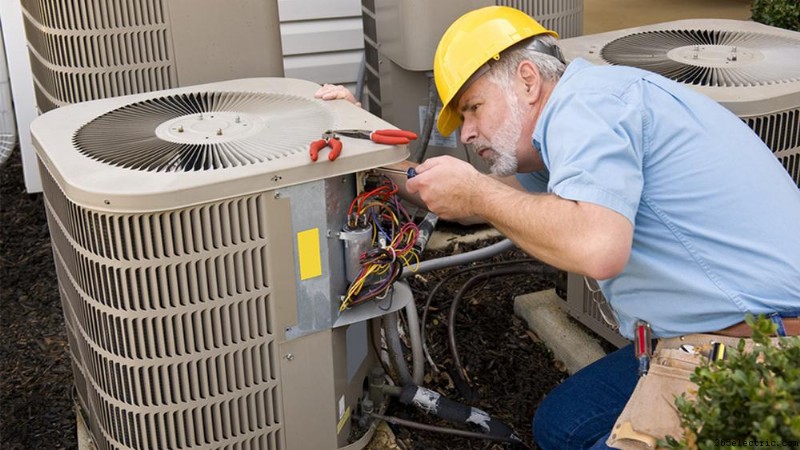10 causes de défaillance d'un compresseur de climatisation et 7 moyens d'éviter une panne de compresseur

La dernière chose que vous voulez pendant la saison estivale est de découvrir par une chaude journée torride que votre climatiseur ne fonctionne pas. Bien que certains problèmes de climatisation ne soient pas si coûteux, si la raison s'avère être une panne du compresseur de climatisation, cela mettra sûrement une grosse brèche dans votre portefeuille.
La bonne chose est que la majorité des problèmes peuvent être évités s'ils sont détectés à temps.
Nous avons compilé une liste complète pour vous aider à diagnostiquer le problème dès le début et vous fournir des mesures que vous pouvez prendre pour éviter le problème à l'avenir.
Que fait un compresseur AC ?
Un compresseur est un composant essentiel et est considéré comme le cœur de votre système CVC. Il est chargé de comprimer le réfrigérant, une substance de refroidissement, afin qu'il puisse circuler dans le climatiseur et évacuer la chaleur (ou l'air froid dans le cas des climatiseurs réversibles).
Ils peuvent durer assez longtemps - 10 à 15 ans s'ils sont bien entretenus.
Cependant, le fait de ne pas entretenir votre climatisation entraînera une augmentation de l'usure. La poussière, les débris ou les fuites de réfrigérant ont un impact plus important sur le fonctionnement de votre compresseur AC.
Ainsi, lorsqu'un compresseur tombe en panne, cela signifie que vous avez une urgence CVC ! Dans certains scénarios malheureux, vous ne pourrez pas le réparer et le remplacement est la seule option.
Comment fonctionne un compresseur de climatisation ?
La chaleur circule d'une zone à haute température vers une zone à basse température. Les climatiseurs fonctionnent sur le même principe.
Le compresseur de votre climatiseur joue le rôle principal dans le processus de refroidissement. Le réfrigérant récupère la chaleur de l'évaporateur. Après cela, il s'écoule vers le compresseur, où il diminue le volume du réfrigérant et le transforme en un état liquide. Lorsqu'un réfrigérant est comprimé, sa température augmente et il se transforme en un gaz à haute pression. Il s'écoule ensuite vers le serpentin du condenseur pour abandonner la chaleur qui est libérée à l'extérieur. Il est ensuite à nouveau converti en un liquide qui s'écoule vers l'unité intérieure. Le processus est répété maintes et maintes fois pour terminer le cycle de réfrigérant.
Pour en savoir plus sur le fonctionnement d'un climatiseur, lisez cet article :Comment fonctionne un climatiseur ?
5 signes avant-coureurs d'une panne de compresseur AC

La réparation ou le remplacement du compresseur est coûteux, et vous voudriez détecter tout problème qui pourrait entraîner une panne du compresseur de votre climatiseur dès que possible. Voici donc cinq signes avant-coureurs indiquant que votre compresseur est sur le point de tomber en panne :
1. Faible flux d'air
Un débit d'air réduit est l'un des premiers symptômes d'une défaillance du compresseur de climatisation. Cependant, il peut être assez difficile de le remarquer car vous continuerez à baisser la température pendant les premiers jours si vous sentez que votre maison n'est pas assez fraîche.
La meilleure façon de savoir si le flux d'air est faible est de mettre les mains sous les aérations. Si vous sentez peu ou pas de flux d'air ou si vous sentez de l'air chaud alors qu'il devrait être frais, cela signifie que votre climatisation a un problème de compresseur. Vous devez contacter immédiatement un professionnel du CVC et le faire réparer.
Lisez cet article pour en savoir plus sur les problèmes de débit d'air CVC.
2. Forts bruits de claquement
Si votre unité CVC démarre avec des bruits de claquement ou de grognement forts et que vous remarquez des vibrations qui l'accompagnent, vous devez être alerté immédiatement. Cela pourrait être le signe de divers problèmes, et la panne du compresseur de climatisation en fait partie.
Ces bruits de courant alternatif indiquent que le compresseur a du mal à démarrer et est susceptible de tomber en panne à l'avenir. Le bruit de claquement signifie également la défaillance des composants électriques du compresseur.
Vous devez immédiatement éteindre votre appareil et contacter un professionnel pour une vérification approfondie de votre système.
3. Fuite de réfrigérant
Les signes révélateurs d'une fuite de réfrigérant comprennent un faible débit d'air, des sifflements, de l'eau autour de votre unité CVC ou la formation de glace sur les serpentins de l'évaporateur. Il serait préférable de résoudre une fuite de réfrigérant de manière urgente car cela pourrait entraîner divers problèmes. Cela peut avoir un impact sur le refroidissement de votre système et entraîner une panne du compresseur à long terme. L'entretien mensuel peut aider à la détection précoce des fuites de réfrigérant avant qu'elles ne risquent d'endommager votre compresseur.
4. Factures d'électricité élevées
Si votre compresseur de climatisation doit travailler plus fort pour refroidir votre maison, il consommera plus d'énergie et fonctionnera plus souvent, ce qui augmentera considérablement vos factures d'électricité.
Donc, si vous remarquez une augmentation soudaine de vos factures sans aucune augmentation de l'utilisation, c'est un sujet de préoccupation. Vous devez immédiatement faire vérifier votre unité CVC pour savoir si elle fonctionne mal et nécessite une réparation.
Voici 16 façons super simples de réduire vos coûts de climatisation.
5. Disjoncteur déclenché
When a circuit breaker trips, it is a measure to protect your appliances from an electrical overload. It happens when you have too many devices running simultaneously or due to a power surge.
However, if your outdoor unit is constantly tripping the circuit breaker, it is not a good sign and indicates AC compressor failure. It means that the compressor needs more power to run because it is overheating.
Turning it back on won’t help in this case; you must contact an HVAC professional immediately.
What Causes AC Compressor Failure? – 10 Common Reasons

AC compressor failure is usually due to an internal problem that impacts the performance of your compressor over time.
Here is the list of 10 common causes of air conditioner’s compressor failure that require your immediate attention:
1. Electrical Failure
An electrical failure can be caused by damaged contactors, wires, and fuses. Acids build up in your system as a result of electrical problems causing other parts of your AC to malfunction as well. Power surges can also result in electrical issues in your air conditioner.
Acid and oxidation buildup is usually a prominent sign of electrical problems in your HVAC system. A trained professional can detect acid buildup during a routine inspection, making the repairs before it gets out of hand.
2. Blockage of Condenser Coils
Lack of maintenance plays a big role in blocking your condenser coils. When they are clogged with grime and dust, they cannot release heat which puts pressure on the compressor. If you continue to run your system in this condition, your compressor can overheat and stop functioning completely.
3. Compressor Overheating
Overheating is a common cause of compressor failure, and there are many factors at play.
If direct sunlight falls on your outdoor unit and there is inadequate ventilation around it, it makes your unit’s compressor overheated. High voltages can also damage the motor causing the compressor to overheat.
Moreover, dirty coils, low refrigerant levels, and lack of insulation; all can contribute to compressor overheating, ultimately resulting in compressor failure.
4. Evaporator Motor Displacement
If your AC’s evaporator motor is displaced, it can force the refrigerant to return to the compressor. This pushes the compressor oil out of its place, and your system can face lubrication issues. It causes the compressor to lose its efficiency over time, and eventually, it will cease to operate.
5. Low Refrigerant Levels
You won’t cool your home without an adequate amount of refrigerant in your air conditioner. It is a common misconception that refrigerant levels decrease with time. Your air conditioner doesn’t use up the refrigerant. If the levels are low, there is likely a leakage that needs to be sorted urgently.
Low refrigerant levels decrease the pressure, which causes the compressor to work harder to push the refrigerant in the system. Eventually, the entire compressor will collapse.
Lack of maintenance can increase corrosion and cause cracks in the AC coils. Therefore, regular maintenance is the only way to avoid this issue in the future.
6. Too Much Refrigerant in Your Unit

Wondering how the excess amount of refrigerant got in your unit? Have you ever had an issue of low refrigerant level and called a technician to fix it?
A less qualified person may not know how to fill it up properly and end up filling it more than what is needed. The refrigerant levels must match exactly with the quantity specified by the manufacturer. High levels of refrigerant can lead to increased pressure in the system, causing premature AC compressor failure.
It’s always recommended to call an experienced HVAC expert to deal with air conditioner issues.
7. Lack of Lubrication
Your HVAC needs the correct amount of lubrication to function optimally. Without adequate lubrication, the wear and tear will increase, making your compressor work harder. When there are low levels of oil, your compressor parts rub against each other. This makes small parts come apart and are let loose in the system.
Loss of lubrication is mostly due to leakage from the evaporator, condenser, pipe connections, or the compressor shaft seal. An overstressed compressor is likely to break down earlier than its expected lifespan.
Getting your air conditioner serviced is the key to prevent this problem. The experts will check the lubricant levels, make any necessary adjustments and see if the oil pump is working fine.
8. Clogged or Damaged Suction Lines
Over time, the suction lines of your refrigerator can develop cracks and holes, hindering the refrigerant flow in the system. This puts stress on your compressor as now it has to use extra power to pump enough refrigerant through the unit resulting in a breakdown. One of the evident signs is a decrease in the cooling capacity.
If you notice your unit is not cooling like it’s supposed to, call an HVAC expert to have a look at the suction lines.
9. Dirt &Debris Stuck in the Outdoor Unit
Outdoor pollutants, dust, debris, soot, and moisture can enter your outdoor unit and cause issues for your compressor.
Moreover, air can also be introduced, and it can dispel refrigerant in the condenser. This can increase the temperature inside the compressor and can cause oil carbonization on the discharge valve. Oil carbonization results in residue buildup and makes the valves leak. Leaking valves further increase the temperature, causing more damage to the compressor.
You can avoid this problem by scheduling annual AC tune-ups.
10. Incorrect Sizing of Suction Lines
If your suction line is too long or too short, it can cause AC compressor failure. Wrong sizing can build pressure and overheat the compressor.
This issue mostly arises when an untrained or amateur technician attempts to repair the line and installs the wrong size. It is always best to call a professional for any AC repairs. They know what type of suction line is best suitable, and they will install the right length of the suction line.
7 Ways You Can Prevent AC Compressor Breakdown
If compressors fail before their expected life, the issue is mostly internal and can be avoided with proper care.
Here are seven steps you can follow to prevent AC compressor failure:
1. Inspect the Wiring
You need a regular professional inspection to check the wiring as you won’t be doing it on your own during monthly maintenance. Wiring issues can lead to acid accumulation which deteriorates many components of your air conditioner, including the most important one – your compressor.
During the inspection, the technician can check and replace any faulty wires and fuses before they lead to acid buildup.
2. Install Voltage Monitor or Surge Protector
You can install a voltage monitor or a surge protector to guard your unit against sudden high voltage, low voltage, or power surges. Some surge protectors even give you a compressor warranty in case of damage or compressor failure.
3. Remove Clutter Around the Outdoor Unit
Leaves, dust, grime, and other pollutants can get stuck inside the outdoor unit interfering with its functioning. Periodic cleaning of the outside unit is crucial to keep it running properly.
4. Keep the Suction Lines Clean
Temperature and pressure changes can impact the normal operation of your compressor. When suction lines become blocked due to excessive dirt, the pressure and the temperature increase, leading to overheating. An overheated compressor can fail quite rapidly.
5. Only Call Qualified Professionals
An unqualified technician can pose fatal problems for your air conditioner. As discussed above, they can fill the refrigerant too much, which can cause compressor failure. Similarly, while repairing suction lines, they may install a short or long suction line which can interfere with the compressor pressure.
Air conditioner repairs are a sensitive matter and should always be handled by HVAC experts.
6. Lubricate Your AC Thoroughly
Considering that the compressor is the heart of your air conditioner, keeping it lubricated is the key to its better health. Lubrication can help in avoiding compressor failure before the expected time.
7. Frequent Cleaning of AC Coils
AC coils collect a lot of debris and need frequent cleaning; failure to do so can interfere with the heat exchange process. When this happens, the compressor has to do extra work to remove the heat.
Now that you know all the causes of AC compressor failure, the lesson is never to ignore any warning signs. The delay will not make the problem go away; it will only add to the damage. If you cannot manage to take care of your system on your own, you can go for an HVAC preventative maintenance contract. This will help in getting the underlying issues fixed before they have a chance to damage the compressor.
